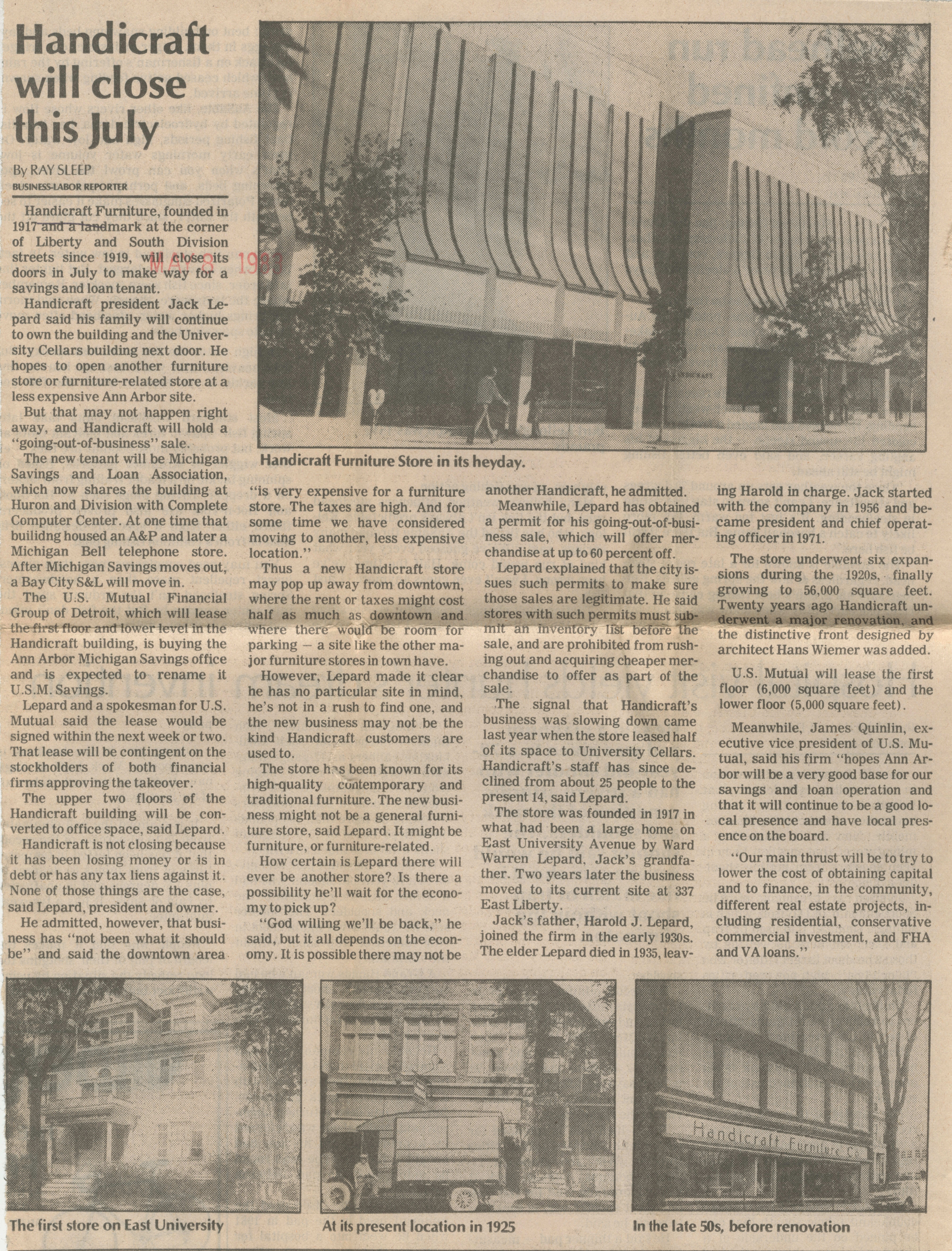Handicraft will close this July

Handicraft will close this July
By RAY SLEEP
BUSINESS-LABOR REPORTER
Handicraft Furniture, founded in 1917 and a landmark at the corner of Liberty and South Division streets since 1919, will close its doors in July to make way for a savings and loan tenant.
Handicraft president Jack Lepard said his family will continue to own the building and the University Cellars building next door. He hopes to open another furniture store or furniture-related store at a less expensive Ann Arbor site.
But that may not happen right away, and Handicraft will hold a “going-out-of-business” sale.
The new tenant will be Michigan Savings and Loan Association, which now shares the building at Huron and Division with Complete Computer Center. At one time that building housed an A&P and later a Michigan Bell telephone store. After Michigan Savings moves out, a Bay City S&L will move in.
The U.S. Mutual Financial Group of Detroit, which will lease the first floor and lower level in the Handicraft building, is buying the Ann Arbor Michigan Savings office and is expected to rename it U.S.M. Savings.
Lepard and a spokesman for U.S. Mutual said the lease would be signed within the next week or two. That lease will be contingent on the stockholders of both financial firms approving the takeover.
The upper two floors of the Handicraft building will be converted to office space, said Lepard.
Handicraft is not closing because it has been losing money or is in debt or has any tax liens against it. None of those things are the case, said Lepard, president and owner.
He admitted, however, that business has “not been what it should be” and said the downtown area “is very expensive for a furniture store. The taxes are high. And for some time we have considered moving to another, less expensive location.”
Thus a new Handicraft store may pop up away from downtown, where the rent or taxes might cost half as much as downtown and where there would be room for parking - a site like the other major furniture stores in town have.
However, Lepard made it clear he has no particular site in mind, he’s not in a rush to find one, and the new business may not be the kind Handicraft customers are used to.
The store has been known for its high-quality contemporary and traditional furniture. The new business might not be a general furniture store, said Lepard. It might be furniture, or furniture-related.
How certain is Lepard there will ever be another store? Is there a possibility he’ll wait for the economy to pick up?
“God willing we’ll be back,” he said, but it all depends on the economy. It is possible there may not be another Handicraft, he admitted.
Meanwhile, Lepard has obtained a permit for his going-out-of-business sale, which will offer merchandise at up to 60 percent off.
Lepard explained that the city issues such permits to make sure those sales are legitimate. He said stores with such permits must submit an inventory list before the sale, and are prohibited from rushing out and acquiring cheaper merchandise to offer as part of the sale.
The signal that Handicraft’s business was slowing down came last year when the store leased half of its space to University Cellars. Handicraft’s staff has since declined from about 25 people to the present 14, said Lepard.
The store was founded in 1917 in what had been a large home on East University Avenue by Ward Warren Lepard, Jack’s grandfather. Two years later the business moved to its current site at 337 East Liberty.
Jack’s father, Harold J. Lepard, joined the firm in the early 1930s. The elder Lepard died in 1935, leaving Harold in charge. Jack started with the company in 1956 and became president and chief operating officer in 1971.
The store underwent six expansions during the 1920s, finally growing to 56,000 square feet. Twenty years ago Handicraft underwent major renovation, and the distinctive front designed by architect Hans Wiemer was added.
U.S. Mutual will lease the first floor (6,000 square feet) and the lower floor (5,000 square feet).
Meanwhile, James Quinlin, executive vice president of U.S. Mutual, said his firm “hopes Ann Arbor will be a very good base for our savings and loan operation and that it will continue to be a good local presence and have local presence on the board.
“Our main thrust will be to try to lower the cost of obtaining capital and to finance, in the community, different real estate projects, including residential, conservative commercial investment, and FHA and VA loans.”
Handicraft Furniture Store in its heyday.
Article
Subjects
Ray Sleep
Handicraft Furniture Co.
University Cellar Bookstore
Furniture Stores
Michigan Savings & Loan Association
A&P
Michigan Bell Telephone Co.
Bay City S&L
U.S. Mutual Financial Group
Has Photo
Old News
Ann Arbor News
Jack Lepard
Ward Warren Lepard
Harold J. Lepard
Hans Wiemer
James Quinlin